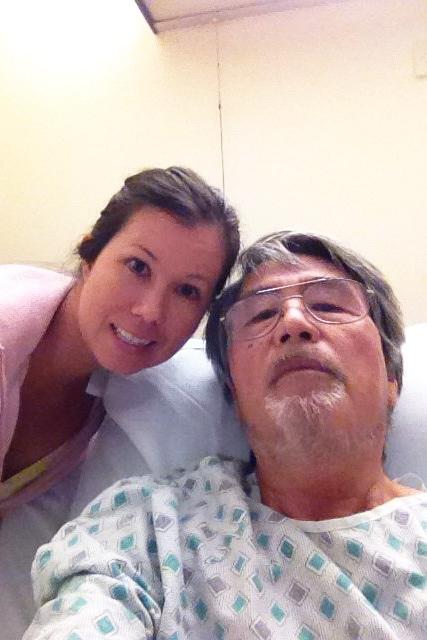
Aki Smith is a caregiver and patient advocate for her father, who was diagnosed with advanced stomach cancer. She’s founder and president of Hope for Stomach Cancer, a nonprofit organization that provides resources to patients, caregivers, and loved ones facing stomach cancer while promoting early detection and prevention to the general and medical communities. Follow her on Twitter: @AkiStoCAN.
On an unusually warm December afternoon in 2016, my dad and I arrived for his routine 3-month primary care physician (PCP) appointment. It was 3 years since my dad had been diagnosed with advanced stomach cancer and my 3-year anniversary of being his full-time caregiver and patient advocate. His PCP had become the doctor we saw regularly and who treated my dad as a whole person.
I nonchalantly said, “By the way, this will be your last visit with Dr. C. He’s no longer covered under your insurance, but we’ll find a replacement.”
My dad’s reaction stunned me. He started to sweat and his face got increasingly red. By the time we got to the doctor’s office, his blood pressure was so high I thought we’d have to go to the emergency room.
I didn’t understand—what just happened?
A grim cancer diagnosis
When my dad was first diagnosed, the survival statistics were stacked against him. The prognosis was grim, and his future unclear. I am an only child, so my plan was to take it 1 day at a time, collect information, and make decisions with him. I coordinated his visits with the cancer care team, writing my questions down ahead of time and taking copious notes.
My dad was extremely concerned about his quality of life after a stomach removal, but doctors weren’t even sure he’d be eligible for surgery. We spent 2 months getting diagnostic testing and second opinions. Eventually, we built a cancer-treating duo—a surgeon and oncologist—that felt there was a chance my dad could be cured. We were assured that a person could live a normal life without a stomach. He decided to take that chance. In 2014, my dad had a total gastrectomy, chemotherapy, and local radiation therapy.
When treatment is over
In 2015, I switched his medical insurance to give him access to medical professionals beyond his cancer care team. We were assigned a PCP. At our first appointment with Dr. C, my dad was incredibly sick, in pain, and merely 97 pounds. He was in remission, yet it didn’t feel that way. The treatment that saved his life also came with severe complications.
I’d always pictured the last day of treatment as a day of celebration. Instead, we were left with anxiety and fear of the unknown. My dad was suffering from chemotherapy side effects, chronic diarrhea, abdominal spasms, and malnourishment. He’d survived cancer but was in no way living life.
However, Dr. C had a plan! He took charge and referred my dad to different specialists. Each professional did an amazing job at diagnosing the problem and finding solutions.
Eventually, my dad’s health got better. He became more independent, and I started to have free time.
PCP support is vital
I attended the 2017 Cancer Survivorship Symposium, a conference co-sponsored by the American Society of Clinical Oncology that focuses on how PCPs can implement cancer survivorship plans. It suddenly hit me why my dad got so upset at the thought of losing his PCP. My dad’s PCP effectively manages his entire cancer survivorship care plan, including his team of medical specialists, and has an open line of communication with us.
For my dad, finding normalcy after cancer was another hardship that his PCP helped him through. My dad trusts Dr. C and feels safe enough to be honest with him. In return, Dr. C is always empathetic, gives us extra time if we need it, and validates every concern, no matter how small it may be. You have to trust your doctor. If you don’t, there’s a problem and you need to get a second opinion.
As a caregiver, I learned that a PCP is extremely valuable in providing cancer survivorship care—even as important as having a great surgeon and oncologist. My dad’s PCP doesn’t treat the cancer; he treats the whole patient. And that makes a world of difference.
Dr. C turned my dad from a man surviving cancer to a cancer survivor.
